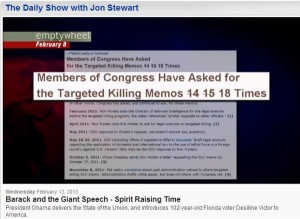What a Targeted Killing in the US Would Look Like
Warning: Several minutes into this video, graphic images of a corpse appear. Also, the government may start tracking your online viewing if you view this YouTube, as someone started following my mostly defunct YouTube account after I watched it.
On October 28, 2009, the FBI set out to arrest a man they claimed, in the complaint justifying the arrest, was “a highly placed leader of a … radical fundamentalist Sunni group [the primary purpose of which] is to establish a separate, sovereign Islamic state.” The leader of the group “calls his followers to an offensive jihad.” The complaint states the group trained in the use of firearms and martial arts and explains that “Abdullah is advocating and encouraging his followers to commit violent acts against the United States.”
The arrest was staged at a warehouse controlled by the FBI, outfitted with 5 closed circuit video cameras that gave the FBI full visibility into anyone entering and leaving the warehouse, as well as pallets loaded with sandbags to provide cover. Altogether 66 FBI Agents participated in the arrest, with 29 Agents, including a K-9 team and snipers, inside the warehouse itself, along with helicopter cover, another K-9 team, and a control room nearby. Members of the FBI’s Hostage Rescue and SWAT teams participated, with Agents flying in from Columbia, South Carolina and DC via a previous operation in Los Angeles. The team had practiced the arrest scenario up to 10 times before the actual arrest.
The arrest started when the FBI detonated 3 pre-positioned diversionary explosives in the room in which the leader, 4 accomplices, two undercover officers and an informant had been moving boxes (the FBI insiders had already left the scene). That allowed the FBI team, wearing bullet proof gear and helmets, to move into place.
On orders, “FBI, show me your hands, on the ground!” the leader’s four accomplices put their hands up and got down on the ground (for a variety of reasons, the FBI doesn’t have recordings of the audio of the event). The leader hesitated, but then got face down on the ground, though the FBI claims his hands were not visible.
At that point, 62 seconds after the diversionary explosions, the K-9 handler, who had been briefed that the leader was the main target of the investigation, released the dog and gave the “bite” command, the first time he had ever done so in the year he had been a K-9 handler; the dog lunged at the leader’s arm or face. The FBI claims the leader raised a gun and shot the dog three times. One accomplice disagrees, describing that the leader had both hands on the dog, trying to keep him away from his face. Two FBI Agents who admitted shooting their rifles also had Glocks, though of a different caliber than the one allegedly used by the leader. There was no gunpowder residue found on the leader and no fingerprints found on the Glock.
In the next 4 seconds, 4 different FBI officers shot the leader with their Colt M4 rifles (3 were from the Hostage Rescue Team that had flown in for this arrest), set on semiautomatic. He was hit a total of 21 times. He died within a minute.
This was the culmination of a 3-year counterterrorism investigation into Imam Luqman Abdullah, a black Muslim who led a mosque in Detroit. The investigation intensified in 2007 as Abdullah and his associates reacted against the transfer of H. Rap Brown (now Jamil Abdullah al-Amin), who had been convicted of killing two police officers in Georgia in 2002, to Florence SuperMax Prison.

